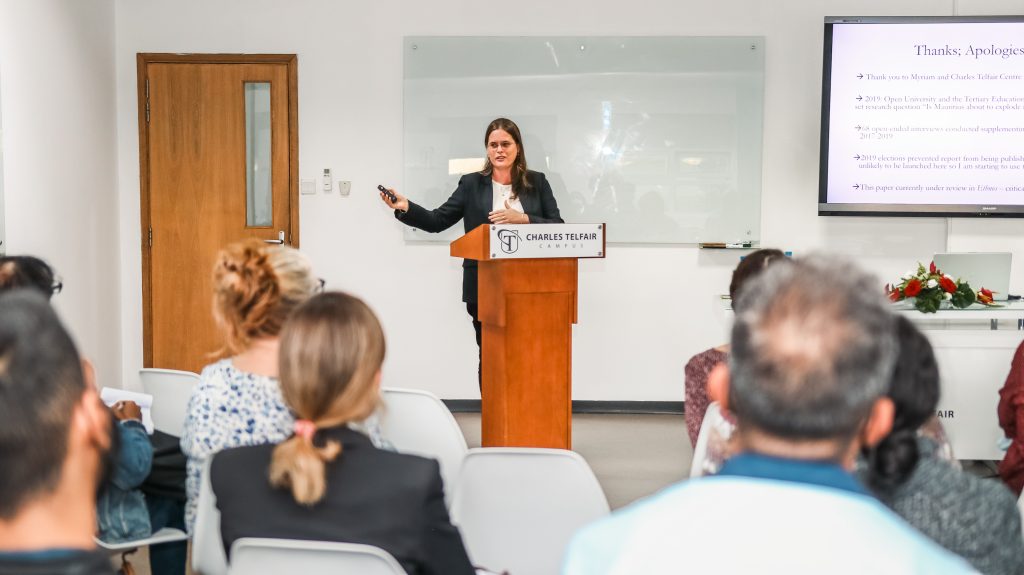On Monday 27th June, the Charles Telfair Centre gathered more than thirty professionals and academics at the Charles Telfair Campus to engage with Associate Professor Jess Auerbach (PhD) on what she names “conscripting communalism”: the system of diversity management that successive Mauritian governments have used through the best loser system.
The central question put to Professor Jess Auerbach when this research was commissioned was “Is Mauritius going to implode into ethnic violence?” The question is non-trivial given Mauritius’ history of ethnic riots in 1968 and 1999. She highlighted that “the perception of the threat of communal violence seems to always be latent such that Mauritian citizens have internalised that threat. It is managed by an inculcated national habitus of conflict avoidance referred locally as “Jay de” (Bhojpuri) or “Lesli” (Kreol) meaning ‘letting go’: when faced with anger or injustice, the advice is to walk away and calm the situation.”
Conscripting Communalism
Through her analysis of ‘peace management’ over the past fifty years in Mauritius, Jess Auerbach introduces the concept of ‘conscripting communalism’. Defined as a process of diversity management rooted in the best loser system*, conscripted communalism enabled the careful arrangement of voting population according to their ethnic and religious group allowing politicians to maximize votes during elections. The logic of such a system rests on the premise that people will vote for candidates who belong to their corresponding ethno-religious groups. Over the past fifty years, conscripting communalism, together with a social contract allocating resources along ethnic lines, were means to manage ethnic diversity and govern the country that enabled remarkable economic growth and social stability. Yet, Jess Auerbach argues that this model of governance no longer works in modern day Mauritius.
The factors which have rendered conscripted communalism obsolete in contemporary Mauritius are multiple. Transformations in demography, residence, educational levels, evolving social norms and expectations as well as the increasing use and preponderance of social media and digital connectivity over the island have all concomitantly contributed to new ways of living and new models of governance. The author points that “social media in Mauritius arrived in fertile soil and by the late 2010s most of the population was engaged in various forms of social media but without necessarily the capabilities to understand the implications in terms of their digital trace”. Public authorities, on the other hand, grabbed the opportunity brought about by social media and surveillance technologies to deploy surveillance tools and “control emerging forms of data and use it to consolidate the power of political-party loyalists”.
Popular resistance and national consciousness
In her presentation, Jess Auerbach reviewed two recent events to demonstrate how Mauritians are increasingly distancing themselves from being solely defined by and controlled through their ethno-religious identities.
The sinking of the M.V. Wakashio in August 2020 is the first incident cited by Jess Auerbach to show that Mauritians demonstrated their angst at the government to act pre-emptively and promptly to prevent oil spill in the marine park of Blue Bay. The peaceful protests following the oil spill as well as the mass mobilization of different groups of the Mauritian population served as reminders that the country is united beyond ethno-religious differences.
The second incident in 2021 was the proposed governmental amendment on Information and Communication Technologies Act (ICTA) to enforce surveillance on citizens’ internet activity which posed a serious threat to freedom of speech of the population. Interestingly, while the public had tolerated diversity management and control through electoral processes, the intention of the government to control social media platforms crossed a line Mauritians would not tolerate. As the author purports, digital connectivity and social media have revolutionized the lives of the local citizens who are able to move beyond their ethno-religious identities in order to create a national consensus over issues which matter to them and to their freedom. This could be the platforms for the rise of a national identity and consciousness.
In her analysis, Jess Auerbach manages to spot an important nuance in the behavior of the respondents. She observes that the transformations in people’s social status and rising prosperity meant that Mauritians adopted a more material culture. She highlights the rise of big houses with high walls, a change from the past whereby people would live close to each other. This growing distance amongst Mauritians together with rising digital connectedness imply that the population is changing. Mauritians are aware of a digital surveillance system to control them through fear yet increasingly resistant to it. Her work clearly highlights that tool of governance and control via conscripting communalism have reached their limit, the open question is what are the trade-offs that Mauritians will be willing to accept when it comes to surveillance, safety and peace?
*Best loser system was the political system established at independence whereby the first 63 seats in parliament are allocated on a first-past-the-post basis and the remaining eight seats allocated on ethno-religious groups so as to ensure that all ethno-religious as defined in Schedule 1 one of the constitution has political representation.
Charles Telfair Centre is an independent nonpartisan not for profit organisation and does not take specific positions. All views, positions, and conclusions expressed in our publications are solely those of the author(s).
